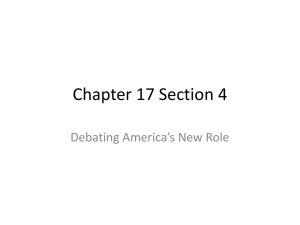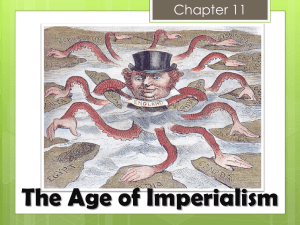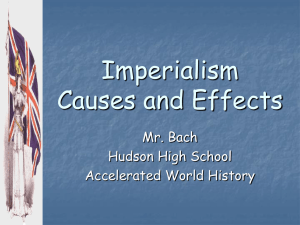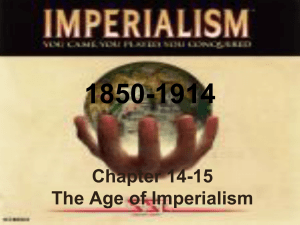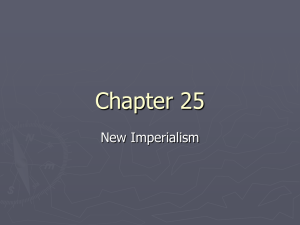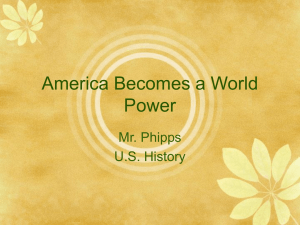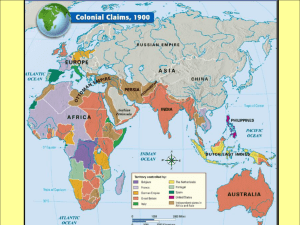Imperialism
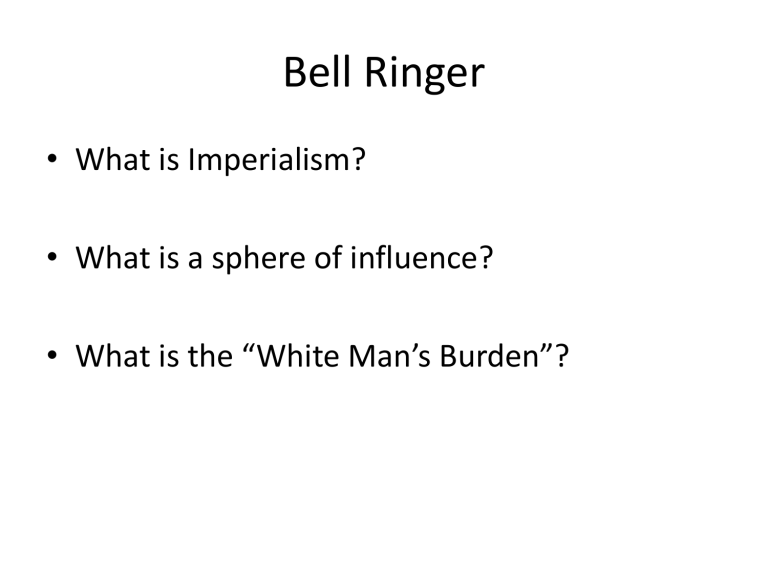
Bell Ringer
• What is Imperialism?
• What is a sphere of influence?
• What is the “White Man’s Burden”?
Bell Ringer
• How is New Imperialism different from Old imperialism?
• What modern day country was once called
Siam?
• What is the Suez Canal?
Bell Ringer
• Where are Laos, Cambodia, and Siam located?
• What South East Asian country did the US control?
• What is the Panama Canal?
CH 17: Imperialism
Origins of Imperialism
• The Industrial Revolution had led to the massive increase of production and consumption.
• This caused European nations
(America Later) to find new markets to sell their goods, and new areas to obtain raw materials from
• Imperialism is the practice where a state takes political and economic control of an area beyond its boarders
• Though some areas will avoid imperialism (Japan, Thailand, Iran, &
Afghanistan) large parts of the world were affected
World before Imperialism
New Imperialism
• In Old Imperialism
Europeans would take control of a land, sail into a port, pick up goods (spices, products, slaves), paid in silver, and sailed away.
• Under New Imperialism
Europeans still took control of these areas, but now they took more control of the politics and economics of these foreign lands.
Political & Socio-Economic Factors
• Politically Europeans engaged in
Imperialism as a way to control key areas (and deprive their competition of it)
• Socio-Economically European nations needed imperialism.
• Mid-late 1800s Europe experienced unemployment, poverty, and strikes
• The ability to conquer and control foreign territory was a source of national pride, and one that helped people forget problems at home
White Man’s Burden
• Europeans also viewed themselves as superior to many parts of the world
• It became a culturally accepted belief that it was their duty to help “civilize” the less developed people of the world
• British Poet Rudyard Kipling famously called this the, “White
Man’s Burden.”
• Though this point of view was extremely racist, it helped to justify European actions
White Man’s Burden
White Man’s Burden
• South Asia
– India
• The British East India Company controlled Indian for a period of time
• The “Great Rebellion” broke out in
India because the British had ignored very specific Hindu &
Muslim religious beliefs regarding animal fat
• The British would regain control, but would take more direct control over the area. Parliament would almost directly control the Raj (Ruler)
• Later the high ranking officials in
India would be groomed by
Europeans. They would sit in high positions, but never actually created laws or policies.
Imperialism In
Asia
Imperialism in Asia
• Central & Southwest Asia
– Iran
– Russia had systematically been expanding southwards since the 1500s
– Britain saw this as a threat and the two empires clashed
– The British and Russians would have independence spheres of influence in
Persia
– Afghanistan acted as a buffer (Meaning neither could take it over)
• East Asia
– China suffered greatly from
European Imperialism
– Though the Chinese were a developed nation, they could not match the technology of Europeans
– Germany, France, Russia, Britain and Japan would all claim areas of
China as their own
– The Japanese also displayed their changed island by defeating the
Chinese and Russians in separate wars
Imperialism in Asia
Imperialism in
Asia
• South East Asia
– Britain had expanded over from Indian into SE Asia claiming Burma, parts of
Mainland Malaysia, and
Singapore
– The French claimed
Cambodia, Laos, Vietnam, and parts of Indonesia because of a history of religious missions in those areas
– The Spanish would gain control of the Philippines, but later lose it to the United
States
• Siam (Thailand was free)
Africa
• Africa will become the next main area that Europeans colonized.
• Originally Europeans had colonies close to the coast so they could pick up shipments of gold and slaves
• Eventually they will claim much of the continent with little regard for natural borders.
Boers or Afrikaners
• The British who settled in South
Africa became known as Boers or
Afrikaners
• They constantly moved inland in search of better land, and for that reason came into conflict with
African Natives (whom the Boers enslaved)
• Once the British outlawed slavery the Boers formed three republics where slavery was legal. The
British would annex one, but legally recognize the other two
• The British and Boers would come into conflict on numerous occasions, and eventually fight two wars in 1881 and 1899 known as the Boer Wars
• South Africa also experienced an economic boom from the diamond and gold deposits found in the area
• 1880, due to increase economic activity on the continent, and more land being claimed, the
Scramble for Africa would begin
Scramble for Africa
• Egypt was an important region during the
Scramble for Africa.
• Both the British and the French had invested in Egypt, and were concerned with the nations well being
• A major reason for the concern was the Suez
Canal, which was built with the help of the
French, and extensively used by the British
• Britain would invade Egypt to help
“stabilize” it
• French would expand their territorial possessions from Algeria
• Germans would claim portions of both African Coast
• Dutch would claim the Congo
Valley River Basin
– The European powers would hold a conference to discuss the well being of Africa
– Really numerous back room deals were made where boarders were drawn up
– The Africans had no representation at this meeting.
Ethiopia
• There was resistance across
Africa to much of the
Imperialist attempts by
European powers
• The King of Ethiopia had modernized his country, including his rather large military
• Italy attempted to conquer
Ethiopia, but suffered huge casualties for their effort
• Ethiopia would be recognized as a sovereign and independent nation
Imperialism in Latin America
• Numerous nations in Latin
America had won their independence in the 1800s
• The British, and other European powers, still saw opportunities in
Latin America
• They wanted nations they were trading partners with to become more economically important, so
European nations would influence or hinder Latin
American nations to their benefit.
• In 1832, James Monroe closed
the American Continents to
“Future colonization by any
European powers.”
• This is known as the Monroe
Doctrine.
• In 1904 Theodor Roosevelt would Introduce the
Roosevelt Corollary
• He said it was the US’ job to protect the weak countries of the Western Hemisphere and to act as “international police power.”
Americas for
Americans
• By declaring the Roosevelt
Corollary President Roosevelt did two things
– Stated Europe had no reason to interfere in Latin America
– The US was now strong enough to fight off European Powers if they needed to
• Roosevelt’s threat did not stop the British or French from establishing and officially claiming lands in South
America, but it did slow them down.
• The US would become involved in the Spanish American War
• The US would get involved in the
Spanish American war to aid Cuba
• The War lasted only 4 months and the US easily won
• The official peace stated:
– Cuba gets their independence, but permanently leases a military base at
Guantanamo Bay to the USA
The Platt Amendment & Teller
Amendment will stop the US from annexing Cuba
1. The US gets Puerto Rico and Guam
2. The US gains the Philippines in exchange for $20 Million.
• So Europeans shouldn’t mess with
Latin America… but the US could
The Spanish
American
War
Panama Canal
• Roosevelt was annoyed that during the Spanish American
War ships had to sail around
South American to get to the
Philippines
• Roosevelt tried to buy the land but was turned down, so instead encouraged the
Panamanian people to rebel against Columbia.
• The 2 biggest obstacles to overcome were disease & geography
• It took 10 years and 40,000 workers but the canal was completed
Imperialism:
Good
• Europe came to view foreign nations as people with skills -> Slavery was bad (by 1888 outlawed in
ALL Western Countries)
• Western medicine helped cure diseases
• Infrastructure (roads, bridges, etc) greatly improved in countries to aid trade
Bad
• Lots of people (natives) died trying to resist stronger
European armies
• Destruction of native cultures, traditions, religions
• Nations lost their identity starting decades long independence movements

